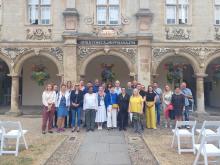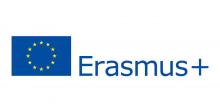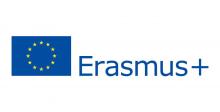LEANBODY - LEAN in Medical Education: Reaching for Quality Management Tools to Teach Human Anatomy Effectively in a Multicultural and Multilingual Learning Space
Project ID
2021-1-HU01-KA220-HED-000027542
Project title
LEAN in Medical Education: Reaching for Quality Management Tools to Teach Human Anatomy Effectively in a Multicultural and Multilingual Learning Space
Project manager, contact details
Dóra Göndöcsné Agócs; agocs.dora@pte.hu
Academic supervisor, contact details
András Dávid Nagy, Dr.; andras.d.nagy@aok.pte.hu
Total project budget
269.471 EUR
Total budget of UP
68.172 EUR
Project start date
Project end date
Coordinator
University of Pecs (HU)


Partner Organisations
Karolinska Institutet (SE); The Chancellor, Masters and Scholars of the University of Cambridge (UK); Sveuciliste u Zagrebu (HR); Masarykova Univerzita (CZ)
General description
Background:
From 2024 the World Federation of Medical Education (WFME) will introduce an obligatory accreditation process for global medical education institutions providing a medical curriculum in English language. At present, Central European Medical Schools in this category are not yet eligible for accreditation by WFME. In particular, Human Anatomy course organizers from these medical schools are in need to develop their abilities to manage their excellent teaching work more effectively in multicultural and multilingual contexts of today, and to align it to global educational sustainability agendas (Sustainable Development Goal 4 on Quality of Higher Education – SDG4, Objective 1.1 of WHO Global Strategy on Human Resources for Health: Workforce 2030). A genuine and adequate needs analysis was prepared for this project and surveyed among all Central European anatomists in Hungary, Czech Republic and Croatia. The survey showed that over 70% of anatomists in this part of Europe know little about international quality standards of medical education, have never heard of the concept of student centered pedagogy or of assessment methods to measure the professional development of attitudes of their medical students or of themselves, and admit to know little about mental health management principles at the workplace despite many of them are doctors themselves. The reason for such a poor level of knowledge of academics about these topics relevant to their actual teaching context is that quality assurance at the systemic level is underdeveloped in Central European medical education in general. What are those components of
teaching traditions in anatomy which can not be eliminated without significant loss in quality or in prestige? Project participants exploring this question are leading anatomists from Central European medical schools (University of Pécs Hungary, Masaryk University Czech Republic, University of Zagreb Croatia) whose research will be augmented by world leading European anatomists (University of Cambridge UK) and educational developers from world leading medical schools (Karolinska Institutet Sweden). As the profile, experience and activities of the participating organisations are highly relevant for the field of the application, the results of this project may significantly help anatomists not only in Central Europe but also globally to deliver a sustainable, high quality, student centered anatomy teaching which is a highly timely expectation of the doctors of the future. Importantly, the project is suitable for creating synergies between different fields of educational experties: between centuries old teaching traditions of anatomists and student centered pedagogies of contemporary professional educational developers. The proposal is innovative, as it will create an online teachers training module accessible for any anatomists worldwide who are willing to adapt their teaching traditions to contemporary global developmental goals and standards (i.e. SDG4). The aims of the proposal are realistic as they are complementary to other initiatives of the participating organisations (CLILMED, EDUC). The proposal brings added value at EU level through results that would not be attained by activities carried out in a single country, as relevant legal frameworks, teaching traditions, perceptions and interpretations of global standards and concepts will be analysed in different cultural contexts of each participating countries.
Objectives:
Participants are aimed to receive a thorough knowledge about legal requirements and international standards relevant to their teaching as anatomists which will allow them to identify gaps or misconceptions in their existing knowledge and beliefs related to these standards. They will get a good understanding of the history, evolution and erosion of teaching traditions of anatomy globally. They will have an opportunity to identify strengths and weaknesses in their own teaching traditions. They will be able to update their knowledge and beliefs about the psychological and cognitive processes involved in studying anatomy in the context of professional attitude development of medical students. They will be able to explore their own limits in their responsibilities as anatomists in the management of attitude development of medical students. They will get an understanding on relevant pedagogical assessment tools in use by experts in ME. They will learn the vocabulary used in student centered learning in general and will identify existing practices in their traditions which comply with student centered learning of which they were not aware of before. They will be able also to identify room for development in their teaching tradition which could help them implement student centered learning fully. They will get an understanding about how mental health is related to attitude development and about the relation of student centered pedagogy to mental health of teachers. They will be able to identify sustainability concerns of student centered pedagogy within their context of university environment as anatomists. As a result, this project will help universities in Central Europe adjust teaching traditions in medical education to international quality standards. Partners from UP, MU and UniZ represent medical universities with the same historical roots in 19th century Austro-German medical education wich was world known that time and still has impacts in excellence on present day teaching traditions in the region. These
riches will be explored in this project and communicated with the help of world known scholars from other European teaching traditions (Cambridge, Stockholm). In this process, drawbacks and gaps in existing traditions of partner countries will be inevitably discovered, the sources of which will be explored by comparing existing legal frameworks, values, and beliefs which shape the thinking of participant anatomists from this region. Results of this project will aid this regional developmental process to complete as the dissemination of these results among all anatomists of the region will allow systematic confirmation of findings of this project. As a result, dropout rates should improve without easing academic rigour in a foundational subject Human Anatomy, mental health management of both anatomists and their students should also improve, while professional attitudes of both teachers and their students should also show measurable improvements on a systematic level. Thus, the project objectives are clearly defined, realistic, and address needs and goals of the participating organisations and the needs of their target groups. Importantly, these points of
improvements are also key goals set by the UN to be improved worldwide, therefore, results of this project and their impact on medical education in Central Europe should be comparable and publishable for global audiences and stakeholders interested in the improvement of medical education in general. This fact is the main reason why global leaders in medical education have joined this consortium as experts.
Implementation:
As a preparation, each partner coordinator will research requirements for quality teaching and intended learning outcomes (ILOs) in medical education in their countries as defined by their national legislation. During the Kickoff meeting in Pécs, Hungary, international standards in the same topic will be presented and definitions will be clarified which are used in relevant assessments and documentations. During the first 12 months of the project, participants will complete a literature review on the epistemic, psychological, sociocultural and economical values of studying human anatomy. In the 8th month, invited experts will provide a brainstorming workshop for project participants at Magdalene College, Cambridge, UK. During this workshop, they will explore how culture and society has shaped expectations of the attitude
of doctors in history and how these expectations were met in the past and can be met today during anatomy courses. During the same workshop, educational developers from Karolinska Institute will provide a brainstorming seminar about student centered pedagogy. Participants of the workshop in Cambridge in 2022 will be provided also with an overview of mental health management in the academic teaching environment. Emphasis will be on the mitigation of the well known life-long risk of mental diseases in doctors. How do performance indicators at the medical and academic workplace shape attitude and how they may trigger mental illness? How to manage related risks? Experts from Cambridge University will guide and advise this training module. Results of the analysis of the first 12 months and outcomes of the Workshop in Cambridge will guide the next phase of the project as follows. In the second 12 months (2023) project participants will build assessment tools. Key experts in this creative process will be professional developmental educators from one of the best ranked medical school of the world, Karolinska Institutet (KI), Sweden. They will deliver a training workshop entitled " Practical training methodology - Integrating the Sustainable Development Goal 4 on Quality Education in Teaching Human Anatomy" at University of Pécs in Summer 2023. The experts from KI will guide the process of adapting this strategy to anatomy courses together with participating anatomists from UP, MU and UniZ. They will focus on how to develop assessment tools and teaching/learning activities (TLAs) for the measurement of attitude development of medical students towards professional values while studying human anatomy. They will carry out a thorough analysis about sustainability concerns how to manage such TLAs in international anatomy courses and how to do assessments of students in these courses. During the third phase of the project, project participants will test the new assessment tools within their regular anatomy courses. Results will be disseminated in Multiplier events in behalf of this project, which will include events integrated to National Conferences of Anatomists of partner countries. After feedback was collected about the obtained measurements from memebers of each national anatomical societies, all results of the project will be integrated into an online teachers training module.
Results:
The needs analysis has already raised awareness of all members of the anatomical societies of three countries which already resulted in arrangements into the promotion and implementation of this project by the leadership of the relevant societies. The results of the literature review and of the critical analysis revolving around epistemic, psychological, sociocultural, and economical values of studying human anatomy will be published in peer reviewed open access professional journals of medical education. The description and the results of these trans-disciplinary meta-analyses will be therefore accessible globally for any anatomists. The assessment tools developed during the project specifically for the needs of anatomists and of medical students studying human anatomy will also be published in a research journal.
These tools will be tested first by project participants in 2023 and then by other Hungarian and Czech anatomists who attended multiplier events in behalf of this project. All pilot measurements and their analysis, and the experiences gathered in project events will be systematically organised, synthesized, edited and integrated into the key intellectual outcome of the project which is an online interactive training module (e-Guidebook) for anatomists globally. The need for such a guidebook is evident among members of the anatomical societies of the participating countries as indicated by the results of the survey conducted prior to the submission of this proposal. Furthermore, international educational collaborations of each of the project partners will benefit from the results of this project, such as CLILMED and EDUC partners of University of Pécs within Europe, and international anatomists from top universities of the world who are partners of University of Cambridge and of Karolinska Institute. Importantly, this project will significantly contribute into the quality of medical education in Central Europe and therefore it will aid in the international competitiveness of medical programs of participating institutions from Hungary, Czech Republic and from Croatia. This improvement in quality, competitiveness, and international visibility will be achieved through tangible efforts into the implementation of SDG4 goals towards inclusivity and equality in Medical Education regionally, and, importantly, at the global level.
Program
ERASMUS +
Application monitoring
News reference




